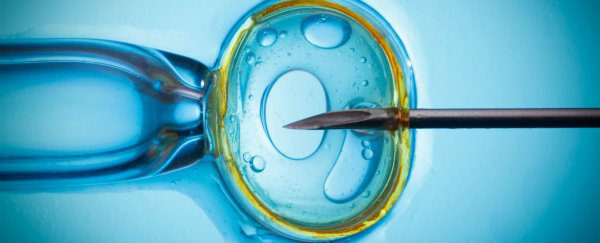The chromosomal abnormalities that affect at least half of the human embryos created for in vitro fertilisation (IVF) can now be predicted within the first 30 hours of development at the cell-1 stage - days before they need to be transferred into a woman's body.
The discovery could help improve the odds of an IVF embryo developing into a pregnancy. Right now, the global percentage for a successful pregnancy from an IVF embryo sits between 30 and 35 percent. The reason such low odds exist is that between 50 and 80 percent of all embryos created for IVF end up developing a severe chromosomal abnormality that can dramatically increase their chances of being miscarried, and but we have no way of knowing which ones before they need to be implanted.
The US-based team has figured out how to tell whether an embryo will develop normally within the first three days after conception. This means that abnormalities can be detected at the earliest stage of human development, which will allow doctors to make a more informed choice when selecting embryos for implantation, and spend less time culturing embryos that were never going to make it.
Prior to the discovery, abnormalities could only be detected at day five or six, which means these embryos have to be cultured and implanted before being identified and miscarried. And that's a horrible experience for the mother, and a waste of resources for the doctors, who could have been cultivating healthier embryos for her.
"A failed IVF attempt takes an emotional toll on a woman who is anticipating a pregnancy as well as a financial toll on families, with a single IVF treatment costing thousands and thousands of dollars per cycle," one of the team, Shawn L. Chavez from Stanford University, said in a press release. "Our findings also bring hope to couples who are struggling to start a family and wish to avoid the selection and transfer of embryos with unknown or poor potential for implantation."
The discovery builds on a study by Chavez and his team back in 2012, in which they found that by timing the first three mitotic cellular divisions in embryonic development while checking whether the process of cellular fragmentation is happening, they can figure out which embryos aren't developing right. The team describes cellular fragmentation as "a phenomenon of unknown origins that is thought to be acellular debris and affects approximately 50 percent or more of IVF embryos".
The current study, which was published in Nature Communications, tested this out on 117 human zygotes from 19 couples, with an average maternal age of 33.7 years. They non-invasively examined the embryos at a single-cell level and compared their chromosomal structure with the make-up of 12 developmentally relevant genes that are activated prior to the first cell division. Using a computer model, they could predict whether the embryo will be chromosomally normal or abnormal as it develops.
"With assisted reproduction at an all-time high, we want to help more families achieve successful pregnancies," said Chavez. "IVF has helped countless women all over the world, and we now have the technology and research to improve a couple's chances of having a biological child of their own. This discovery can potentially increase those chances."
While it's not clear at this stage how this will actually affect IVF treatments, the researchers are keen to have their research continued by other teams to figure out even stronger markers for abnormalities.
